Current policy actions and recommendations informing our work
- infoqtwav
- Mar 3, 2025
- 7 min read
Updated: Dec 22, 2025
The following is a summary of relevant recommendations and principles that have been proposed, supported or agreed to by the Queensland Government across State and Commonwealth policy areas. These include:
QUEENSLAND

Pride in Our Communities 2023-2032: is the Queensland Government's first strategy for Lesbian, Gay, Bisexual, Trans, Queer, Intersex, Asexual, plus (LGBTQIA+) communities.
● Impact Area One: Inclusive Culture
● Impact Area Two: Stronger Communities and Connections
● Impact Area Three: Providing responsive, inclusive and accessible services
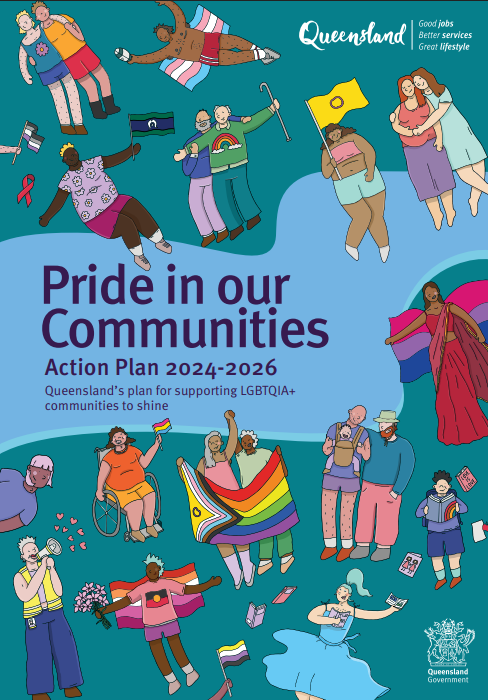
Action 35. Embed targeted domestic and family violence (DFV) responses by and for LGBTQIA+ communities across Queensland’s extensive domestic, family and sexual violence reform program
Action 41. Work with the domestic and family violence and sexual violence specialist service sector to ensure services are inclusive of and responsive to the needs of LGBTQIA+ people
Action 42. Support DJAG-funded domestic, family and sexual violence specialist service providers to gather data about the experiences of LGBTQIA+ people in accessing DFV services, to inform ongoing Queensland Government service design and delivery.
Queensland’s Plan for the Primary Prevention of Violence Against Women 2024-28: is a 5-year plan developed by the Queensland Government to address the drivers of violence against women and prevent domestic, family and sexual violence (DFSV) from occurring.

Focus Area 1: Leadership and Community Awareness and capability building. Community driven initiatives are crucial to ensuring that primary prevention activities are not just ‘delivered,’ but are developed alongside the community based on their needs and local contexts, including addressing the impacts of intersecting forms of disadvantage... Central to this is engaging everyone in the prevention of violence, including Aboriginal and Torres Strait Islander peoples, LGBTIQ+ people, culturally and linguistically diverse people, people with disability, older people, children and young people, and people living in regional and remote Queensland.
The Women's Safety and Justice Taskforce was established as an independent, consultative taskforce by the Queensland Government to examine:
coercive control and review the need for a specific offence of domestic violence
the experience of women across the criminal justice system.
The Taskforce made recommendations to the Attorney-General and Minister for Justice, Minister for Women and Minister for the Prevention of Domestic and Family Violence.
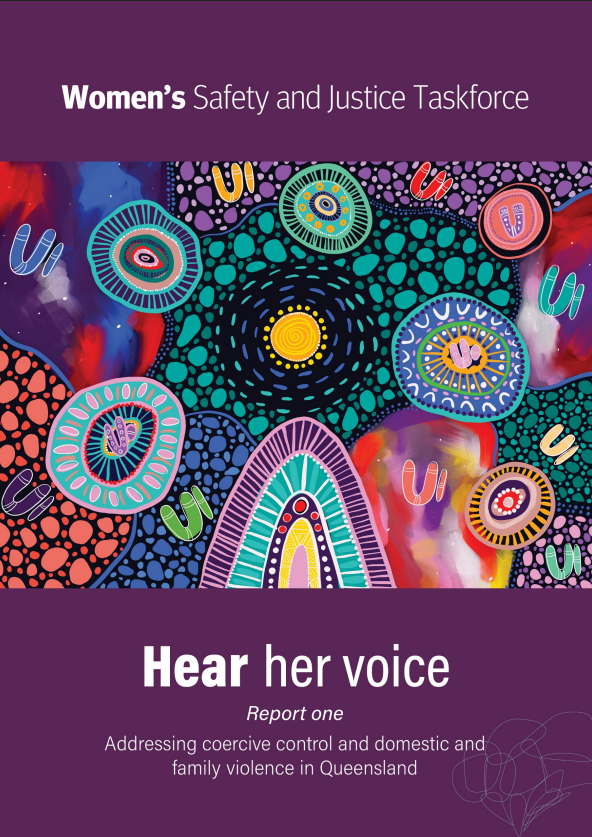
Recommendation 8. Creation of targeted, community-specific resources about coercive control and changes to the law, including LGBTIQA+ communities
Recommendation 13. The Queensland Government develop a five-year whole-of-government domestic and family violence service system strategic investment plan encompassing services and supports delivered and funded by Queensland Government agencies. The strategic investment plan will guide investment decision-making over the next five years including in relation to: …services that are better tailored to meet the needs of people from culturally and linguistically diverse backgrounds, people with disability and LGBTIQA+ people, young people and older people

Recommendation 1: Primary Prevention community education campaigns inclusive of LGBTIQA+ communities
Recommendation 10: The Queensland Government develop a five-year whole-of-government strategic investment plan for the services delivered and funded by government agencies to prevent and respond to sexual violence The plan will include the provision of: …services to meet the needs of people from culturally and linguistically diverse backgrounds, people with disability and LGBTIQA+ people, children, young people and older people
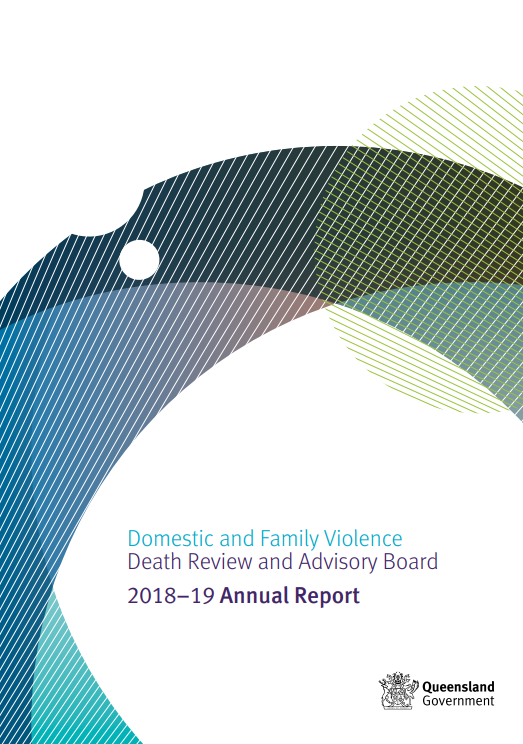
The Domestic and Family Violence Death Review and Advisory Board is responsible for the systemic review of domestic and family violence deaths in Queensland. The establishment of the board was a key recommendation from the Special Taskforce on Domestic and Family Violence Final Report, Not Now, Not Ever: Ending domestic and family violence in Queensland
That government funded and other organisations that currently provide support services for victims and their children, and perpetrators of domestic and family violence, review how their services are promoted and branded to ensure they are inclusive and accessible for LGBTIQ+ people where appropriate.
NATIONAL

Recommendation 1: Fund specialist organisations to deliver accessible and culturally appropriate education and outreach on WSH. These organisations include settlement and multicultural services, LGBTIQA+ organisations, youth centres, disability services, women’s services and Aboriginal and Torres Strait Islander services. This work would complement the work of unions, the National Access to Justice Partnership Agreement 2025-30 and the Respect@Work Working Women’s Centre funding.
Recommendation 4: Amend the Workplace Gender Equality Act 2012 (Cth) to drive safer, more inclusive workplaces by requiring data collection on the experiences of workers with disability and those from LGBTIQA+, First Nations, and culturally and racially marginalised backgrounds. Introducing numeric targets under each Gender Equality Indicator will improve visibility of systemic inequities, support evidence-based action, and strengthen employer accountability for the safety and wellbeing of all workers.
Recommendation 11: Strengthen employer accountability for preventing workplace sexual harassment by: a) Amending section 49 of the Australian Human Rights Commission Act 1986 (Cth) to enable better information sharing between regulators. b) Introducing civil penalties for breaches of the Positive Duty under the Sex Discrimination Act 1984 (Cth).
National Action Plan for the Health and Wellbeing of LGBTIQA+ People 2025-2035: This action plan outlines Australia’s national approach to improving the health and wellbeing of LGBTIQA+ people from 2025 to 2035.
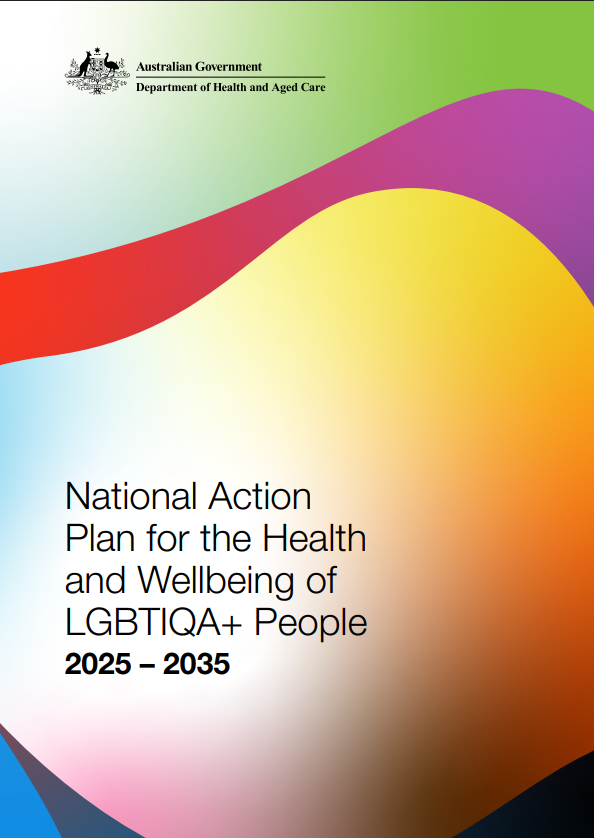
Action 1: Establish strong leadership within the Australian Government to champion diversity and inclusive behaviours:
a. Embed people with lived experience in governance groups across the Department of Health and Aged Care and broader government
b. Ensure LGBTIQA+ people are engaged on issues that impact them
Action 7: Build capacity and scale of health and wellbeing services for LGBTIQA+ people
a. Support LGBTIQA+ community controlled organisations providing targeted care and support across LGBTIQA+ communities
• Support LGBTIQA+ community-controlled health services providing safe, inclusive and integrated care to LGBTIQA+ people. This includes, but is not limited to general practice, mental health and wellbeing, substance use, sexual and reproductive health care, and family, domestic and sexual violence services.
b. Support Aboriginal Community Controlled Health Services and Primary Health Networks to improve access to services for First Nations LGBTIQA+ people
Action 9: Support LGBTIQA+ people to access appropriate family, domestic and sexual violence supports
a. Ensure family, domestic, and sexual violence responses include targeted supports for LGBTIQA+ people
• All LGBTIQA+ people, including First Nations and culturally and linguistically diverse LGBTIQA+ people should have access to culturally safe and trauma informed family, domestic, and sexual violence support services. This includes protections and services for older people experiencing abuse (elder abuse)
Action 12: Build a pipeline of culturally safe and inclusive health and wellbeing workers
a. Promote LGBTIQA+ specific health care needs in workforce planning
Action 13: Upskill the existing workforce to ensure responsive and safe care
c. Work with relevant professional and peak bodies to review and update clinical guidelines to ensure they are inclusive of LGBTIQA+ people
Action 14: Improve collection, disaggregation and publication of LGBTIQA+ data across health and wellbeing datasets
a. Be guided by the Australian Bureau of Statistics (ABS) 2020 Standard for Sex, Gender, Variations of Sex Characteristics and Sexual Orientation Variables (2020 Standard) in the design of Australian Government population health datasets
Action 15: Ensure data is used routinely in policy and planning activities
c. Ensure all policy and programs evaluate impacts on LGBTIQA+ people, where appropriate
Action 16: Promote and facilitate research that builds the evidence base and addresses knowledge gaps
a. Define national research priorities for LGBTIQA+ health and wellbeing
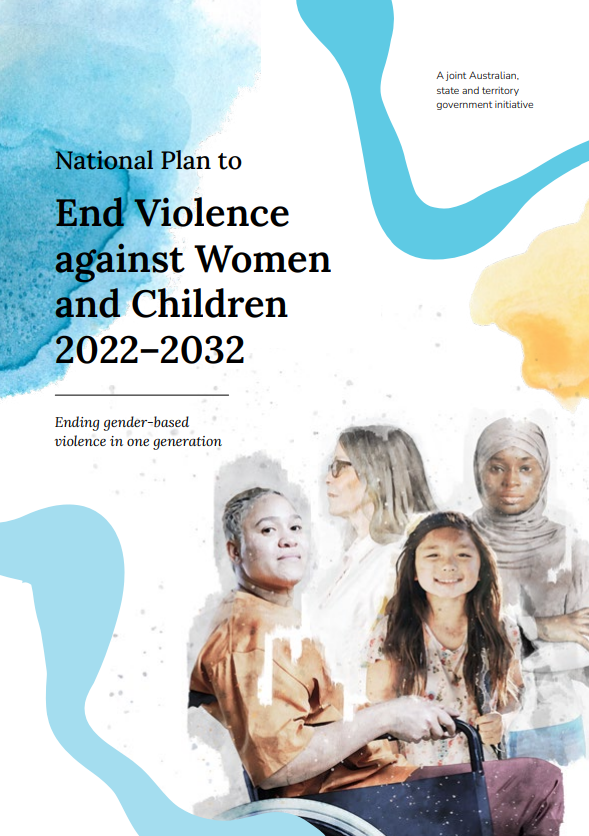
The National Plan to End Violence Against Women and Children 2022-2032: is the overarching national policy framework that will guide actions towards ending violence against women and children in one generation. It highlights how all parts of society need to work together to end gender-based violence in one generation.
● The National Plan seeks to explicitly include LGBTIQA+ people and children as part of Australia’s commitment to ending all forms of gender-based violence
● LGBTIQA+ people experiencing or recovering from violence must have access to safe, inclusive and affirming services, and have choice and control over the services they access. To achieve this, the National Plan promotes increased investment in sexual, domestic and family violence services and programs led by LGBTIQA+ specialist services across Australia. It also promotes building the capacity of the broader service system to respond to the needs of LGBTIQA+ people
● Collaboration and partnerships between specialist domestic, family and sexual violence services and other services such as... LGBTIQA+ community organisations... are critical in increasing the ability to provide tailored, expert care and support
● work to address violence against LGBTIQA+ people should be led by organisations and individuals within those communities, based on their own frameworks and priorities

Reform area 5: Inclusion and intersectionality:
● Systemic and structural transformation of mainstream government organisations is necessary to improve accountability and respond to the needs of Aboriginal and Torres Strait Islander peoples, particularly in the family violence, child protection and justice systems. This... has particular salience for LGBTIQA+ Sistergirl and Brotherboy, and gender-diverse people.
● Explore creation of accessible and trauma informed crisis and accommodation services, suitable for LGBTIQA+ Sistergirl and Brotherboy, people with disability and Elders across the nation
● Support Aboriginal Community-Controlled Organisations aimed at preventing and responding to violence experienced by LGBTIQA+, Sistergirl and Brotherboy in Aboriginal and Torres Strait Islander communities e.g. rainbow tick accreditation (racism and homophobia).

The Commonwealth Inquiry into Family, Domestic and Sexual Violence 2021: On 4 June 2020, the House Standing Committee on Social Policy and Legal Affairs adopted an inquiry into family, domestic and sexual violence. The inquiry was referred by the Minister for Women, Senator the Hon Marise Payne, and the Minister for Families and Social Services, Senator the Hon Anne Ruston.
Recommendation 43: The Committee recommends that policies and programs relating to family, domestic and sexual violence as it affects LGBTQI communities be developed in partnership between government agencies and LGBTQI organisations.

National Strategy to Prevent and Respond to Child Sexual Abuse 2021-2030: is the first of its kind in Australia, and provides a nationally coordinated, strategic framework for preventing and responding to child sexual abuse. It seeks to reduce the risk, extent and impact of child sexual abuse and related harms in Australia. The National Strategy was a key recommendation of the Royal Commission into Institutional Responses to Child Sexual Abuse (Royal Commission), and responds to approximately 100 other Royal Commission recommendations to address child sexual abuse in all settings.

Implementation Standard 2: Accessible and inclusive services Organisational and service activities
● Maintain partnerships with ACCOs and others who provide specialist services to priority groups (for example, LGBTQIA+)
● Are accredited with related standards (for example, Rainbow Tick, Child Safe Accreditation)

2030:
Long Term Outcome 5: Victims and survivors of child sexual abuse, including secondary victims, receive high quality therapeutic responses and support at all stages of life… Support also must meet the needs of diverse groups of people, including those who… identify as LGBTQIA+


